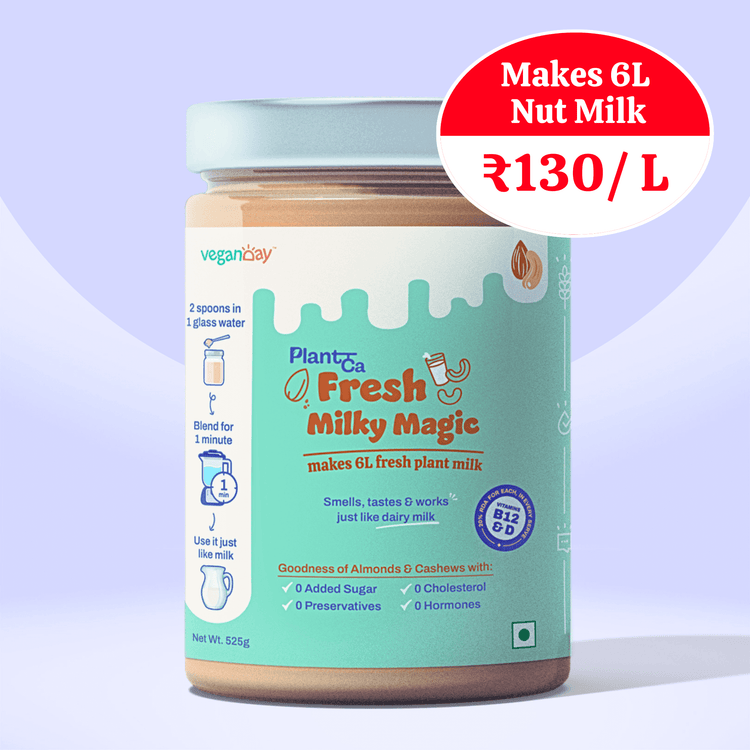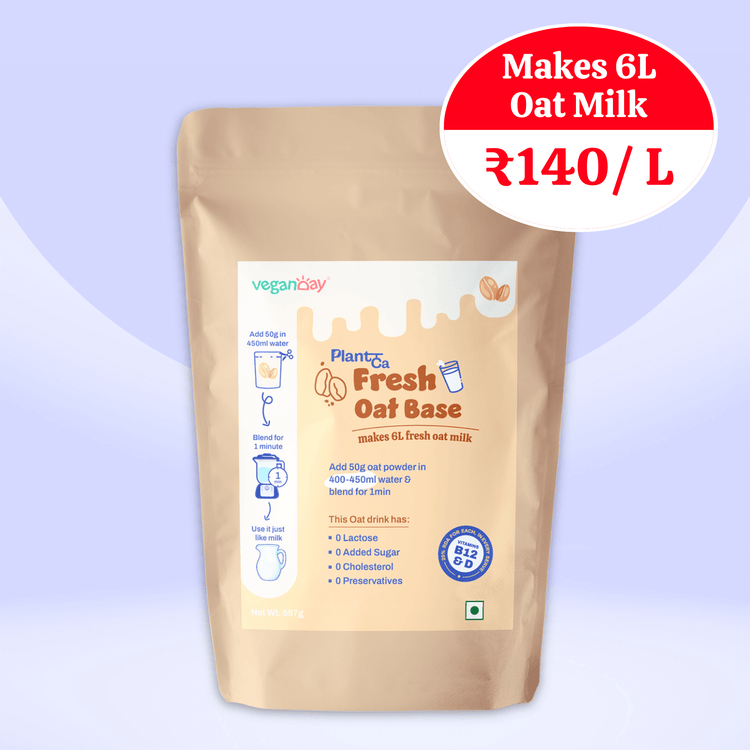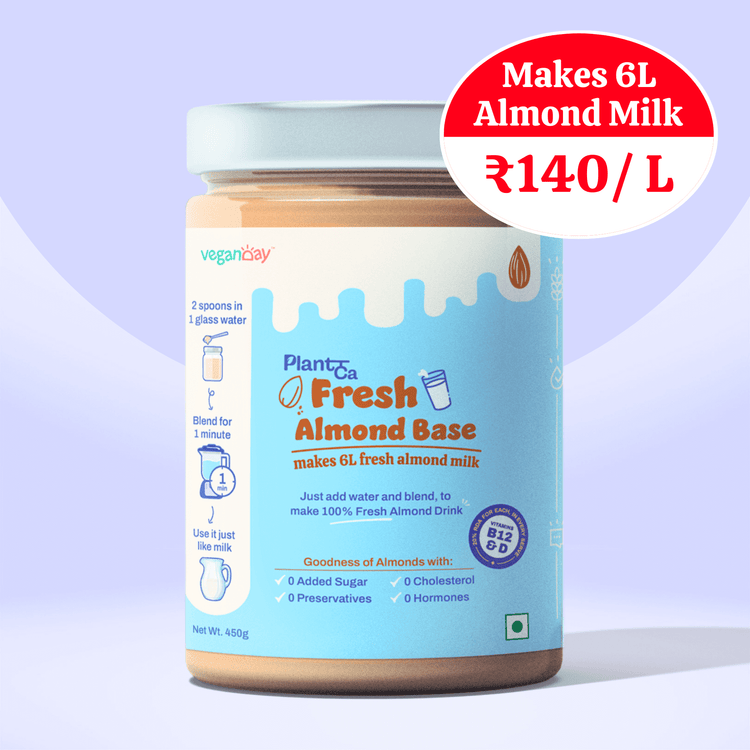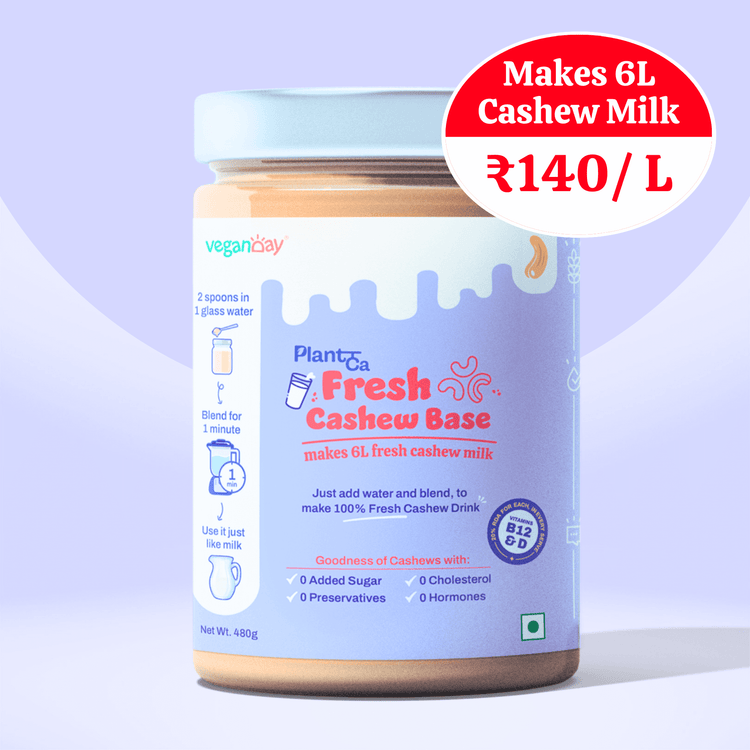India is often considered the vegetarian capital of the world, with about 30%+ of the population identifying as vegetarian³. However, vegetarianism in India doesn't mean abstaining from all animal products, especially dairy. India is also the largest milk producer in the world, with an expected production of 175 billion litres of milk in 2019². Dairy products are widely consumed and revered in India, as cows are traditionally viewed as sacred by Hindus, who make up the majority of the population.
However, a new movement is growing in India - veganism. Veganism is the practice of avoiding all animal products, including meat, eggs, dairy, honey and leather, for ethical, environmental or health reasons. But why are more and more Indians choosing to go vegan? And what are the challenges and opportunities they face in doing so? Let's explore some of the factors that influence veganism in India.
Why go vegan?
There are many reasons why people choose to go vegan, but some of the most common ones are:
1) Ethics: Many vegans are motivated by a sense of compassion and justice for animals, who suffer immensely in the animal agriculture industry. They reject the exploitation and killing of animals for food, clothing or entertainment. They also recognize that animals are sentient beings who have their own interests and emotions, and deserve respect and dignity. Some vegans also extend their ethics to human rights issues, such as workers' rights, women's rights and anti-casteism.
2) Environment: Another major reason why people go vegan is to reduce their environmental impact. Animal agriculture is one of the leading causes of greenhouse gas emissions, deforestation, water pollution, soil erosion and biodiversity loss. It also consumes a lot of land, water and energy resources that could be used for other purposes. By going vegan, one can significantly lower their carbon footprint and help conserve natural resources.
3) Health: Some people go vegan for health reasons, as a plant-based diet can offer many benefits such as lower cholesterol, blood pressure and risk of heart disease, diabetes and some cancers. A plant-based diet can also provide all the essential nutrients that humans need, as long as it is well-planned and balanced. Many vegans also report feeling more energetic, lighter and happier after switching to a vegan diet.
What are the challenges?
Despite these benefits, going vegan in India is not without its challenges. Some of the common obstacles that vegans face are:
1) Social pressure: One of the biggest challenges that vegans face is dealing with social pressure from family, friends and society at large. Veganism is often seen as a radical or extreme choice that goes against the cultural norms and traditions of India. Many vegans face ridicule, criticism or hostility from their loved ones or strangers for their decision to go vegan. They may also face difficulties in finding vegan food options when eating out or attending social events.
2) Lack of awareness: Another challenge that vegans face is the lack of awareness and education about veganism among the general public. Many people are unaware of what veganism entails or why someone would choose to go vegan. They may also have misconceptions or myths about veganism, such as thinking that vegans are protein-deficient, weak or unnatural. Vegans may have to constantly explain their choices and debunk these myths to others.
3) Accessibility: A third challenge that vegans face is the accessibility of vegan products and services in India. While it is relatively easy to find fresh fruits and vegetables in India, it may be harder to find other vegan staples such as tofu, soy milk, mock meats or cheese alternatives. These products may be expensive or unavailable in many parts of the country. Similarly, finding vegan-friendly restaurants, cafes or caterers may be challenging in some areas.
What are the opportunities?
Despite these challenges, there are also many opportunities for veganism to grow and thrive in India. Some of these are:
1) Cultural diversity: One of the advantages that India has is its rich and diverse cultural heritage that offers a variety of cuisines and dishes that are naturally vegan or can be easily veganized. From dal (lentil soup) to dosa (rice crepe) to pani puri (fried bread with spicy water), there are many delicious vegan options to choose from in Indian cuisine. India also has a history of vegetarianism and ahimsa (non-violence) that can be used to promote veganism as an extension of these values.
2) Community support: Another advantage that India has is its growing and vibrant vegan community that offers support, guidance and inspiration to new and existing vegans. There are many online and offline platforms where vegans can connect, share and learn from each other, such as social media groups, blogs, podcasts, magazines, festivals, meetups and potlucks. There are also many vegan activists, advocates and influencers who raise awareness and educate the public about veganism through various campaigns, events and initiatives.
3) Market potential: A third advantage that India has is its huge market potential for vegan products and services. As more and more people become aware of the benefits of veganism and the demand for vegan options increases, there are many opportunities for entrepreneurs, businesses and investors to tap into this growing segment. There are already many successful examples of vegan startups, brands and ventures in India that offer innovative and affordable vegan solutions, such as Goodmylk (plant-based milk and yogurt), Vegandukan (online vegan store), Vegan Bites (vegan catering service) and Ahimsa Trust (vegan advocacy organization).
Conclusion
Veganism in India is a growing movement that faces many challenges but also offers many opportunities. By overcoming the social, cultural and practical barriers that prevent people from going vegan, and by leveraging the existing strengths and resources that India has, veganism can become a mainstream and sustainable choice that benefits animals, humans and the planet. 🌎
Sources:
- In India, 81% limit meat in diet and 39% say they are vegetarian | Pew .... https://www.pewresearch.org/short-reads/2021/07/08/eight-in-ten-indians-limit-meat-in-their-diets-and-four-in-ten-consider-themselves-vegetarian/.
- Veganism in India, how the dairy-loving country is embracing a plant .... https://www.lifegate.com/veganism-in-india.
- Veganism Statistics India In 2022 - Truly Experiences Blog. https://trulyexperiences.com/blog/veganism-statistics-india/.
- Veganism Statistics India In 2022 - Truly Experiences Blog. https://bing.com/search?q=veganism+in+India.
- Being Vegan In India - Forbes India. https://www.forbesindia.com/article/recliner/being-vegan-in-india/4482/1.






